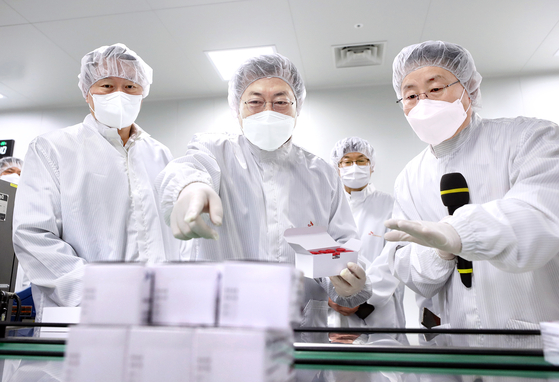
President Moon Jae-in visited SK Biosciences in Andong-si, Gyeongbuk on the morning of the 20th of last month to look around the COVID-19 vaccine production facility and listen to the explanation of plant manager Lee Sang-gyun. On the left is SK Chairman Choi Tae-won. SK Biosciences is consigning production of AstraZeneca, a corona19 vaccine that will be introduced in Korea. Central photo
The quarantine authorities first announced their official position to review the introduction of a new coronavirus infection (Corona 19) vaccine in Russia’Sputnik V’. This is because uncertainties about the introduction of vaccines are growing. In the midst of this, as the introduction of Pfizer’s product, known as the first vaccine introduced in Korea, was delayed, the AstraZeneca vaccine was shipped for the first time at the SK Bioscience plant in Andong, Gyeongsangbuk-do on the 24th of this month, and the domestic vaccination started. It is highly likely that the first domestic vaccine will be changed from Pfizer to AstraZeneca.
Korea’s first vaccination, not Pfizer, AZ… shipped from SK Bio factory in Andong, Gyeongbuk on the 24th
At the’Citizen Participation Special Briefing’ on the 8th, Chung Eun-kyung, head of the Korea Centers for Disease Control and Prevention, said, “There is uncertainty about the introduction of the Sputnik V vaccine in Russia.” We plan to continue to review them.” Commissioner Chung added, “It means that we will open all the possibilities and put all vaccines in candidates,” and added, “The contracts and other aspects are not being reviewed specifically.”
The reason why the government put Russian vaccines on the review table is because of the COVID-19 mutant virus. South Africa recently withheld the vaccine because the AstraZeneca vaccine was not effective in preventing mutagenic viruses. In addition, uncertainties in the supply of supplies remain, as the introduction of Pfizer vaccines, which are supposed to be supplied by the multinational vaccine supplier COVAX Facility, continues to be delayed. Vaccine shortages in Europe and other places and homeland egoism raise uncertainty.
Russian vaccine treatment has changed. The immunity effect was confirmed to be 91.6% in a paper by Lancet, a global medical journal. It was published on the lancet and passed the world’s best expert verification. Even over the age of 60, the effect was 91.8%. There were no serious side effects, the price was 20 dollars, cheaper than Modena (50-74 dollars) and Pfizer (40 dollars), and it had the advantage of being able to distribute at room temperature at 2-8 degrees.
In the midst of this, 750,000 AstraZeneca vaccines will be shipped from the SK plant on the 24th. The SK Bioscience plant in Andong, North Gyeongsang Province is consigned to producing AstraZeneca vaccine. An official from the health authorities said, “The logistics center is packaged in small quantities as required for each hospital and delivered to about 2,000 nursing hospitals and public health centers nationwide to begin vaccination.” “It will be right on the staff. It will be right in 2-3 days.” Nursing homes are visited by public health centers and inoculated. The medical staff of the local vaccination consignment medical institution go together to inoculate. The Agency for Disease Control and Prevention will determine who is eligible for vaccination by the 20th at the latest according to shipment on the 24th. If vaccinated to the elderly aged 65 or older, 750,000 people can be vaccinated by the end of this month.

AstraZeneca vaccine. EPA = Yonhap News
The government’s delivery to nursing hospitals is a measure with 65-year-old vaccinations in mind. On the 28th of last month, when the Korea Institute for Disease Control and Prevention announced its vaccination plan, it announced its policy to give AstraZeneca vaccine to 750,000 patients and workers in nursing homes and nursing homes. A disease agency official said on the 8th that “this position has not changed yet.” Chief Chung also said on the same day, “(The Central Pharmacy Review Committee of the Ministry of Food and Drug Safety) was not confirmed that the AstraZeneca vaccine was not effective for people over 65, but information and data were insufficient, so it was recommended to make a more careful decision.” said.
In a briefing on the 8th, health officials strongly suggested the possibility of getting AstraZeneca vaccine in the elderly over the age of 65 through the mouth of an expert. Choi Won-seok, a professor of infectious medicine at Korea University Ansan Hospital, who attended the special briefing said, “There is no safety concern when comparing the elderly and young people with the AstraZeneca vaccine.” I can’t.” Professor Choi said, “In fact, we have to judge the current situation and comprehensively determine whether there is a vaccine available in our country.”
“My mother is in her 80s and, of course, I would recommend getting the AstraZeneca vaccine,” said Nam Jae-hwan, a professor at the Catholic University’s Department of Biomedical Science. “When the order comes back, I will recommend that you get any vaccine.”
Meanwhile, the Ministry of Food and Drug Safety is scheduled to hold a final inspection committee meeting at 2 pm on the 10th to announce the approval of AstraZeneca vaccine.
Reporters Seongsik Shin, Minwook Kim, Sooyeon Hwang, Heechul Moon [email protected]
